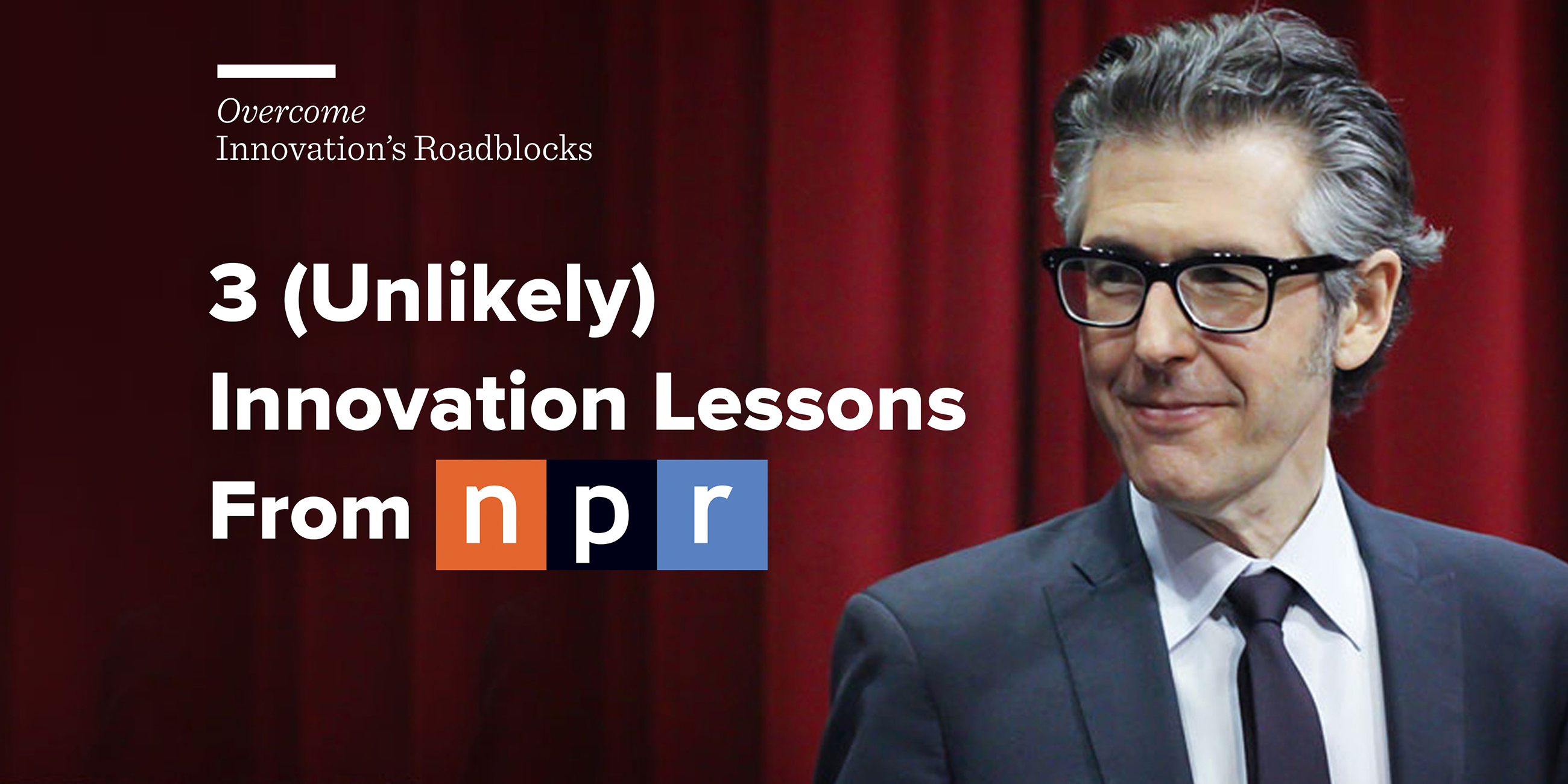3 (Unlikely) Innovation Lessons from NPR

For all the talk of “disruption†and “rapid rate of change,†it can feel like the same old brands and leaders are touted as the titans of innovation year in and year out.
In this multi-part series we’ll look beyond the beloved behemoths and startup darlings to discover inspiration in unlikely sources — NPR, opera and stand-up comedy. (Check out the first article in this series, 3 Innovation Lessons from Louis C.K., highlighting stand-up comedy.)
Whether you’re tuned in terrestrially or streaming podcasts at 2x speed, audio programming is on the rise.
And while there are many things innovators can learn from audio’s renaissance, the hyper efficiency of the medium should have every innovator envious.
- It takes 6,000 person-hours on average to create 1 minute of a blockbuster movie.
- Network TV is slightly better, requiring an estimated 1,000 person-hours for every 1 minute of content.
- Public radio? Estimated about 5 person-hours for every 1 minute of air time.
So what’s one secret to pushing out live, high-quality content on a shoestring budget?
The NPR Clock
image credit: NPR.org
Listen long enough and you’ll recognize the pattern. NPR junkies know it already.
Newscast 1 at three minutes past the hour. Segment A kicks in at ten after, followed by the first funding request. You hear it every hour, you’ve likely never seen it.
This minute-by-minute template is what keeps national networks and local station producers seamlessly synchronized, content creators in line and show hosts on track.
Corporate innovators who are being asked to do more with less and in the half the time would be wise to learn from NPR.
3 Ways to Innovate like NPR
1. Build Speed from a Collaboration Framework: The NPR Clock focuses on creating a common framework to synchronize and integrate the efforts of thousands of collaborators, but doesn’t dictate how they should go about accomplishing their tasks. While it may be tempting to obsess over detailed processes and methods, as an innovation leader your time is best spent integrating your team’s many disciplines. Focus on how your teams can feed off each other’s strengths and dovetail cleanly, just as local stations and national networks do every hour.
2. Constraints Spark Creativity: For public-radio content creators, the NPR Clock isn’t a burden—it’s a creative blessing in disguise. It serves as a consistent canvas which allows creators to focus on developing their content, and (surprisingly) doesn’t impede spontaneity. While it may be tempting for corporate innovators to dream of a world without the “constraints†of existing assets and capabilities, that would be a huge mistake. The most successful brand innovators have shown that existing assets aren’t burdens at all—they enable faster, less-expensive innovation.
3. Nothing Is Written in Stone: While the NPR Clock is beloved, it isn’t above reproach. National and local producers obediently follow the NPR Clock, all the while taking careful note of how it should be improved, in ways big and small. So too, corporate innovation teams must focus fiercely on advancing their solutions, while taking time to tend to their tools and challenge their “status quo†methods.
I’d love to hear where you find fresh inspiration in unlikely spaces?Â
feature image credit: Barclay Agency – Ira Glass, This American Life
I’m always up to chat with people who are looking for new approaches to raising innovation’s success rate. Set up a quick 20-minute chat with me here. Interested in receiving the full set of LPK Roadblocks to Innovation cards and sharing feedback?
Wait! Before you go…
Choose how you want the latest innovation content delivered to you:
- Daily — RSS Feed — Email — Twitter — Facebook — Linkedin Today
- Weekly — Email Newsletter — Free Magazine — Linkedin Group
 Nicholas Partridge is senior innovation director at LPK and he’s obsessed with creating “the newâ€: be it product, service, brand or experience. Nick is a veteran innovator, having partnered with the world’s most powerful brands and scrappy upstarts on their hairiest innovation challenges. Prior to LPK, he served as co-head of Idea Couture (NYC), as innovation director at Fahrenheit 212 (NYC) and as industrial designer at Essential (Boston). On Twitter at @KnewNewNeu.
Nicholas Partridge is senior innovation director at LPK and he’s obsessed with creating “the newâ€: be it product, service, brand or experience. Nick is a veteran innovator, having partnered with the world’s most powerful brands and scrappy upstarts on their hairiest innovation challenges. Prior to LPK, he served as co-head of Idea Couture (NYC), as innovation director at Fahrenheit 212 (NYC) and as industrial designer at Essential (Boston). On Twitter at @KnewNewNeu.
NEVER MISS ANOTHER NEWSLETTER!
LATEST BLOGS
Three things you didn’t know about credit cards
Photo by Ales Nesetril on Unsplash Many of us use credit cards regularly. From using them for everyday purchases to…
Read MoreFive CV skills of a business-minded individual
Photo by Scott Graham on Unsplash The skills listed on a CV help employers quickly understand your suitability for a…
Read More



